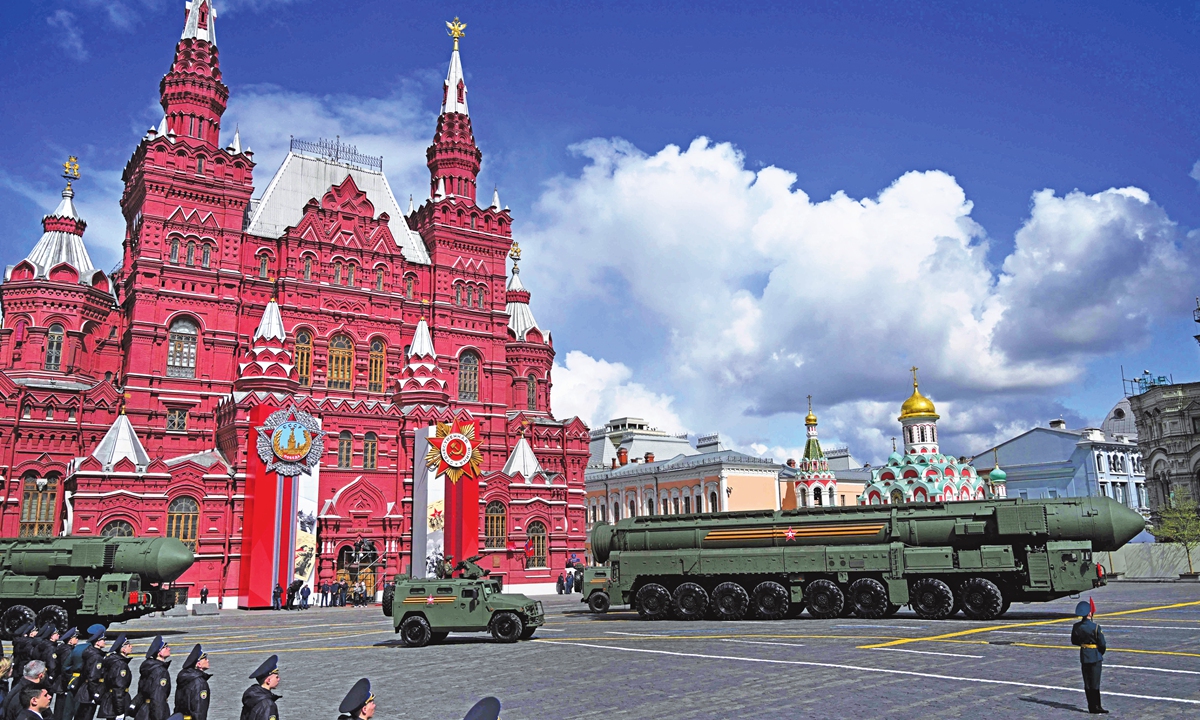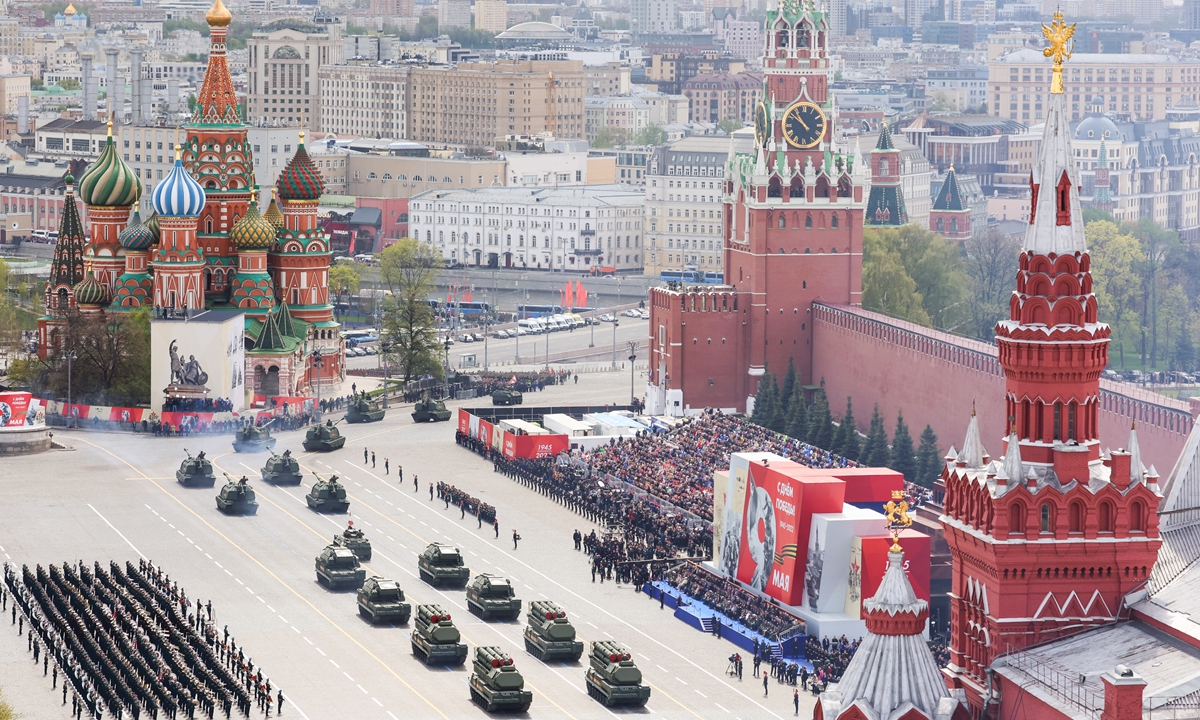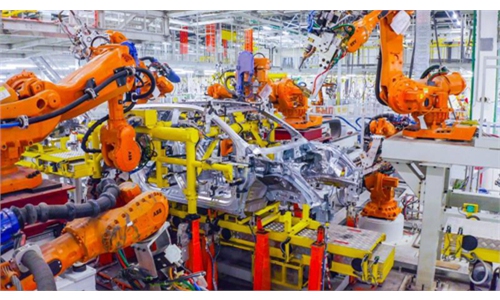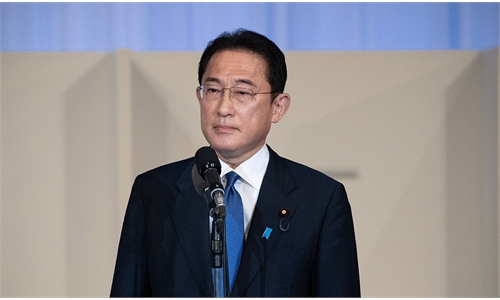Putin’s calm, restrained Victory Day speech 'left room for negotiations'
Battle in Donbass will be a ‘long one’ for Russia: analyst


Russia holds 2022 Victory Day military parades.Photo:VCG
In his Victory Day speech on Monday, Russian President Vladimir Putin "calmly but firmly" stated that Russia had to take preemptive actions in its special operation in Ukraine as NATO had created an "absolutely unacceptable threat" at Russia's borders. According to Chinese analysts, the speech was delivered in a "restrained" manner to send a clear signal to the West that Russia will not accept intensified pressure to squeeze Russia's strategic space, but at the same time showed Putin was leaving some room for negotiation.
In his 11-minute address at the Victory Day military parade in Moscow's Red Square to commemorate the 77th anniversary of the Soviet Union's victory over Nazi Germany in World War II, which Russia refers to as the Great Patriotic War, Putin said the decision to launch the operation against Ukraine on February 24 had been the only correct choice, as "we saw how the military infrastructure was unfolding… with the most modern weapons being regularly delivered from NATO countries. Russia offered a preemptive rebuff to the aggression - this was a forced, timely and the sole correct decision, one taken by a strong and independent country," Sputnik reported.
The Russian President said that NATO countries had refused to listen to Russia, as they had been preparing an attack on Crimea, and the NATO bloc had systematically created an "absolutely unacceptable threat" to his country, and moreover, directly on Russia's borders.
"Everything had indicated that a clash with neo-Nazis, Bandera-followers, on whom the United States and its allies had staked, would be inevitable," Putin stressed.
Chinese analysts said that contrary to how the West had "demonized" Putin by speculating that he would formally declare a "war" against Ukraine or use the occasion to announce major targets, Putin did not mention Ukraine directly nor did he give any sign that the conflict would spill over into other countries, nor used fierce rhetoric to stir up any confrontational sentiments among the public and military in his speech.
Cui Heng, an assistant research fellow from the Center for Russian Studies of East China Normal University, told the Global Times that Putin explained his security concerns in the speech, as the unilateral expansion of NATO without caring about other countries' security concerns had exacerbated the security situation in eastern Europe and provoked Russia's reaction.
Wang Yiwei, director of the Institute of International Affairs at the Renmin University of China, told the Global Times that one of the main purposes of the parade was to show the West that Russia will not accept more squeezing of its strategic space.
The West aimed to completely weaken Russia through prolonging the Russia-Ukraine conflict and attempted to kick Russia out of the UN and the international order so that the West could start a new set of order while ignoring the current international rules, Wang said.
But Putin did not harshly criticize NATO or the US so as to "maintain decency" for both sides and leave room for future negotiations, Cui said.
The military parade to celebrate the 77th anniversary of the victory over Nazi Germany took place in Moscow's Red Square, featuring 11,000 military personnel and 131 items of military and special hardware. The airborne section of the military parade was cancelled due to unfavorable weather conditions, TASS reported.
The Chinese Embassy in Russia said on Monday that the great victory 77 years ago is of special significance to both China and Russia and to the entire history of mankind. History cannot be denied, China will work with Russia and other countries to resolutely uphold the achievements of the victory in WWII and international fairness and justice, practice true multilateralism and achieve world peace, stability and sustainable development.
At Monday's media briefing, Chinese Foreign Ministry spokesperson Zhao Lijian said that one of the important inspirations the World Anti-Fascist War offered is that countries should respect each other, seek common ground while putting aside differences, attach great importance to the security concerns of countries, use dialogue instead of confrontation, and replace splits with unity, adding that this is the right way to maintain world peace and promote common development.
On the Russia-Ukraine conflict, China has reiterated its stance of defusing tensions and promoting peaceful negotiations.
During a virtual meeting between Chinese President Xi Jinping and German Chancellor Olaf Scholz on Monday, Xi said that the Ukraine crisis has once again pushed European security to a critical crossroads, and China supported Europe in playing an active role in promoting peace talks and in building a balanced, effective and sustainable European security framework.
Xi said all efforts must be made to avoid the intensification and expansion of the Ukraine conflict, and China welcomes all efforts that are conducive to promoting peace talks.
Intensified fighting
During his speech, Putin also said that soldiers fighting in the Donbass region of eastern Ukraine are fighting for motherland and for its future.
Some of the soldiers who took part in the parade had recently returned from the frontlines, according to Putin.
The military parade has traditionally been seen as an important symbol for Russia to boost its patriotism, solidarity and soldiers' morale, which was best illustrated in the famous military parade in 1941 when soldiers marched through Red Square and immediately into the battlefield, Cui said.
He said that like in 1941, the Russian soldiers who marched in Monday's parade were likely to join in the frontline of the Russia-Ukraine conflict afterwards.
Fighting has intensified in the Donbass region in recent days. On Monday, Russian troops pummeled a seaside steel mill in the port city of Mariupol after civilians evacuated the plant, AP reported.
Yang Jin, an associate research fellow at the Institute of Russian, Eastern European, and Central Asian Studies under the Chinese Academy of Social Sciences, told the Global Times on Monday that the battle in Donbass would be a long one, with little prospect of Russia winning any time soon.
Russia had wanted to take Donbass as soon as possible and even sign a peace agreement, and Monday's parade was more about boosting morale, Yang said, noting that the battle for eastern Ukraine hit a stalemate in recent days, especially after massive military support from the West continued to arrive in Ukraine.
Cui predicted that the conflict will go into a stage of"fighting while negotiating," and the negotiations will be conducted between Russia and the US rather than be restricted to Russia and Ukraine.
US' anxiety
Russia's V-day parade was conducted amid growing pressure from the West.
One day ahead of the parade, the US unveiled a new layer of sanctions on Russia, targeting services and its defense industry. US First Lady Jill Biden made an unannounced trip on Sunday to Uzhhorod, and met with Ukrainian First Lady Olena Zelenska.
Also on Sunday, Canadian Prime Minister Justin Trudeau announced weapons and equipment aid for Ukraine after meeting with President Volodymyr Zelenskyy in Kiev, and the G7 nations pledged to phase out or impose outright bans on Russian oil and gas.
Cui said the growing pressure and sanctions by the US and its allies showed that the West was anxious to defeat Russia, especially as the Biden administration is facing huge pressure over a weakening domestic economy and hefty financial aid for Ukraine, knowing that getting deeper into the mire of the Russia-Ukraine conflict would harm its domestic midterm election prospects.
On the other hand, Wang said with its support for Ukraine stretched to the limit, the US was in urgent need of its allies to demonstrate their commitment to the cause, and help its military sector continue making money from sending weapons to Ukraine.




